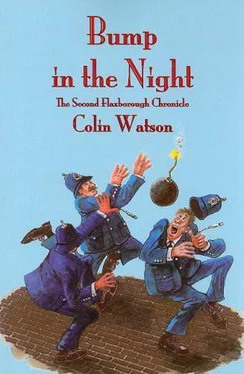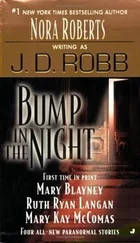Looking at some stills outside the picture house was a big, loose-legged man in a brown, chalk-striped suit. His hands, clasped behind him, looked like a pair of courting Flamborough crabs. The back of his neck had the colour and texture of peeled salami.
Hearing Hoole’s key in the shop door, the man turned.
“Hello there, Sawdust.”
Hoole did not look round immediately. He knew who stood there. Only one person in Chalmsbury delighted still to use the epithet earned long years ago at the Grammar School by the boy Hoole’s shameful propensity for being sick in class and requiring the attendance of the caretaker with his bucket of sawdust and his deep, contemptuous sighs. Stanley Biggadyke, his chief tormentor at that time, had a memory crammed like a schoolboy’s pocket with revolting oddities and carefully preserved bits of ammunition.
“Morning, Big.” Hoole had used the pause to quell a strong temptation to outdo the other’s offensiveness. He held open the door and grinned a bland, unmeant welcome.
Biggadyke stepped past him and peered round the dark little box of a shop. “Somebody’s pinched those glasses you did for me,” he announced.
“Pinched them?”
“Well they’ve gone, anyway. I’ll have to have another pair.”
“Have you the prescription?”
Biggadyke gestured carelessly. “I’ve got nothing. I thought you kept all that sort of thing.”
Hoole pulled out a drawer in a small filing cabinet and fingered quickly and delicately through cards. He eased one up. “You had those spectacles six years ago. I’ll have to test your eyes again.”
Biggadyke’s mouth, which was normally kept hanging slightly open like a ventilator in the dark red heat of his complexion, shut and twisted. “Trust you to pile on the extras. All right. Sawdust, let’s get on with it. I’ve been waiting half the morning for you already.”
Hoole opened a door at the back of the shop and preceded Biggadyke up a short flight of narrow, carpeted stairs to the room above. Other customers, he knew, would soon be arriving for appointments but they would have to wait. He couldn’t trust himself to face a postponed encounter with Biggadyke in anything like his present state of self-control.
Calmly he switched on the lamps over his charts and padded around making preliminary adjustments to pieces of equipment that his patient eyed with sceptical amusement. “All part of the act, eh, old man?”
The optician hummed good-humouredly. When he was satisfied with his arrangements he motioned Biggadyke to sit in the padded, upright chair facing a mirror in which the charts, behind and above the chair were reflected.
The sound of a horn, strident and imperious, penetrated the quiet, shuttered room. Biggadyke raised his head and scowled. “That’s my bloody car.” He listened a while, then relaxed. “Kids. Carry on, Sawdust.”
Hoole opened a small, glass-fronted case. “You can drive all right without glasses, then?”
“I can drive blindfold, cock.”
Hoole grunted and sorted out a tiny brown bottle and a dropper from the contents of one of the shelves. “Hold your head well back and look to one side.”
Biggadyke winced as Hoole let fall four or five drops of icy liquid into each red-rimmed eye. “Just blink them in,” said Hoole. “They won’t hurt.”
“You didn’t do this last time.”
“It’s better if I can take a good look inside. That’s what this stuff is for. Keep your head back a few minutes.”
Hoole had good reason to remember ‘last time’. It was the only occasion—since his schooldays, at least—on which he had allowed himself to fall victim to one of Biggadyke’s practical jokes. The town, he supposed, was still enjoying the story. A choice fragment of the Biggadyke legend. ‘He’s a card, old Stan; a proper rum ’un’. How rum could one get, Hoole asked himself. He glanced, almost apprehensively, at the reading chart. The four biggest letters that formed its top line were just as they ought to be: black, solid, meaningless. Not—his scalp tingled at the recollection—as they had unaccountably appeared to prim old Mrs Garside when she had taken the chair and been asked to read them immediately after Biggadyke’s last visit to his consulting rooms. Hoole looked just once more to satisfy himself that Biggadyke had not again, in an unobserved moment, superimposed that frightful four-lettered word (cunningly hand-printed in reverse for mirrored presentation) upon the chart behind him.
Half an hour later Biggadyke strode from the shop, leaving Hoole, punctiliously professional, smiling in the doorway and holding against his waistcoat his lightly clasped, white little hands.
Before crossing to where a long, pale grey sports car was parked on the opposite side of the road, Biggadyke glanced quickly to left and right. He had begun to step out for the other pavement before realizing that there had been something odd about those glimpses of Watergate Street. He looked again to the right. Yes, the roadway seemed to bulge and shimmer. He blinked hard and looked up at the buildings. They appeared normal at first, then the horizontal lines of the roofs and parapets slowly sagged and blurred. And at the edge of every solid object there was an aura of intense violet light.
Biggadyke resolutely shut his eyes and shook his head. When he again peered around him, squinting past half lowered lids the view was more nearly in focus. He saw his car quite clearly—almost unnaturally clearly—in front of him. He reached for the door handle. To his surprise, he grasped nothing; he had to take fully two more steps before he could touch the car.
Feeling by now that mixed shame and alarm that the sudden failure of a physical function arouses in men normally robust, Biggadyke was at the same time aware of Hoole’s responsibility for his condition and determined to deny him the satisfaction of seeing any evidence of it. He swung himself into the driving seat, started the engine, and, with a hideous tattoo of defiance from its exhausts, swung the big car into the centre of the road and aimed it as best he could on a mean course between the rows of curiously undulating shops.
He navigated the rest of the length of Watergate Street successfully, if only because it happened to be almost clear of traffic, the level crossing at its lower end having been closed a short time before. Only the Borough Bridge needed to be crossed; then he could turn off the square into the broad sanctuary of the White Hind’s car park and rest until his sight returned to normal.
The car was on the bridge, moving slowly forward. Biggadyke knew that there would be a policeman on point duty where the bridge carriageway entered the square. He peered with painful concentration through the windscreen and searched among the luminous, lunging shapes ahead for one that might be a blue helmet.
He was still searching when an angry shout reached him from behind. Instinctively he glanced back. There the helmet was, bobbing in the intolerable glare of the sunshine.
In that instant, the front of the sports car folded before the massive radiator of a cattle truck and Biggadyke, flung like soft clay upon his admirable multi-dialled dashboard, closed his troublesome eyes and slept.
If the noise of the collision reached the ear of Mr Hoole, ministering to his second customer of the day in the quiet, softly lighted upper room, he gave no sign of being either disturbed or elated by whatever speculation it raised in his mind. “Head back just a fraction,” he murmured. “That’s fine.” He delicately manipulated the dropper. One little globule fell neatly into the corner of each eye of the knowledgeable Mrs Courtney-Snell, who smiled and said: “Distending the pupil, eh, Mr Hoole?”
“Exactly!” replied Hoole admiringly. Mrs Courtney-Snell was not a National Health patient.
Читать дальше












